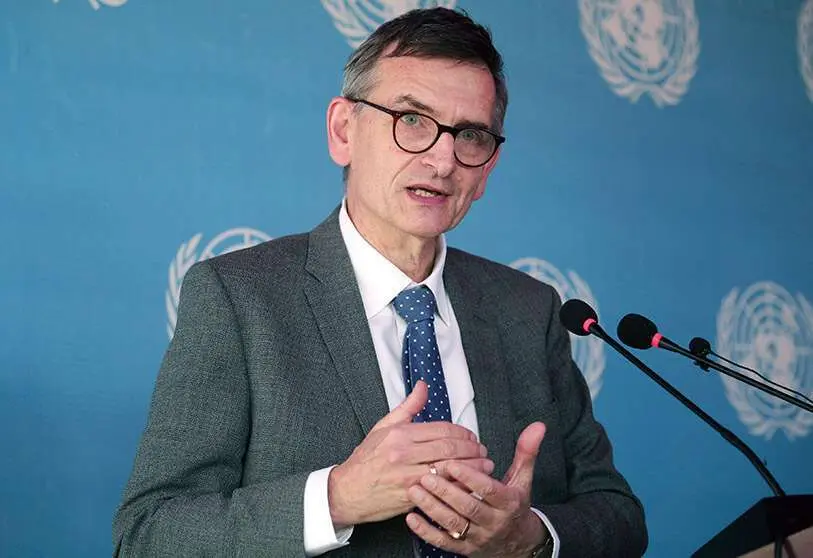Russia participates in consultations to bring peace to Sudan

Russia makes a move in Sudan. The African country, hit by a major political and social crisis, is trying to draw up a road map to put the country on the road to democracy at a delicate moment following the recent resignation of the former prime minister, Abdullah Hamdok.
Faced with this situation, countries such as Egypt and the United States, diplomatic allies, have tried to mediate in Sudan in order to reach a consensus on the election of a prime minister capable of leading the country's transition. However, these are not the only countries that have wanted to intervene in Sudan's new political stage. Now Russia has also wanted to comment on the matter, and from the Republican Palace of Sudan, the Russian ambassador, Vladimir Giltov, has stated that Moscow "supports the leadership and the people of Sudan" and that it would be working to "help the Sudanese to overcome the current situation" while respecting "the best interests of Sudan".

In a meeting with a member of the Sovereignty Council, Giltov said the two sides had discussed the trajectory of bilateral relations between Russia and Sudan and agreed to further "strengthen them" and foster joint cooperation "in all fields".
Since the peace agreement signed in 2020 that put an end to 17 years of conflict, Russia has closely followed the transition process. In this context, Giltov told the Sudan News Agency that Russia's support for Sudan stems from the "success" that took place during the transition period itself.

Moreover, these statements come at a time when the United Nations Integrated Transition Assistance Mission in Sudan (UNITAMS) has called for talks to support "political consensus in the country", which has been praised by Sudanese Sovereignty Council member Al-Taher Abu Bakr Hajar. Moreover, this timing coincides in a context in which the African Union, due to the coup d'état perpetrated last October, decided to suspend Sudan's membership of the Union, something it could revoke if a new peaceful trajectory is achieved.
Alongside this, the British ambassador endorsed the initiative proposed by the head of UNITAMS to try to reach a consensus between the different political factions, reflecting a society that is highly polarised between those who support military rule and those who support civilian rule and the subsequent holding of democratic elections.

In this vein, the UN Special Envoy in Khartoum told a press conference that his first intention in Sudan was to "hold talks" separately "with each side". He would then move on to a second phase in which he would try to lead a negotiation process between the two parties, through "a direct or indirect meeting".
Thus, via Twitter, the spokesman indicated that initial consultations had been held with the different political parties, including the Forces for the Declaration of Freedom and Change, the Sudanese Communist Party and the Sudan Congress Party, as well as several representatives who would be part of "resistance committees". He also reportedly spoke to women's and civil society groups in order to "talk to all parties" to reach a peaceful political settlement.
Moreover, this new roadmap is part of a plan announced just a week ago by the United Nations Office for the Coordination of Humanitarian Affairs (OCHA), which unveiled a humanitarian aid plan aimed at supporting Sudan in this new political phase.

The plan, which aims to allocate 1.7 billion dollars, "will be used for life-saving actions", according to the UN Secretary General, Sthépane Dujarric. The move has been viewed positively by Sovereign Council President Abdel Fattah al-Burhan, the political figure who led the coup against Hamdok.
Prior to the announcement of the plan, Sudan had been waging an intense day of demonstrations that further aggravated the political and social situation in the country. The authorities have openly waged a battle against civilians and this has only inflamed the population.
Since the coup d'état, the country has been in a political freeze. The transition, paralysed by al-Burhan's seizure of power, is trying to rise from the ashes of violence. Sudan, a country that has not yet known peace, is trying to return to the forefront of a peaceful process where all sides are heard and society is united for the common good: the defence of democracy. However, the population carries the burden of a violent and cruel past that has distanced talks between the parties themselves. Once again, diplomacy has the role of resolving a conflict that, despite the difficulties, wants and needs to achieve peace.








